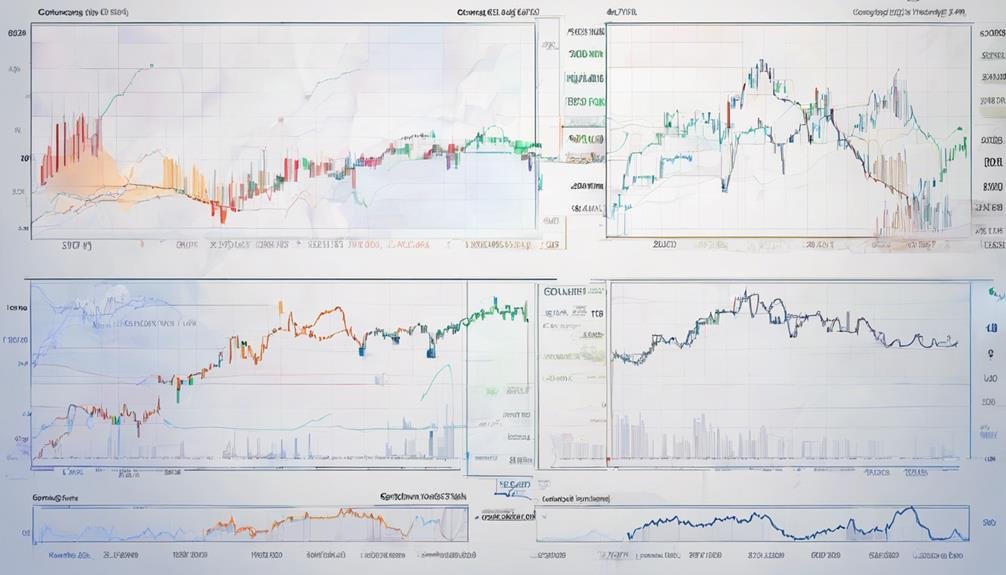Understanding crypto-to-crypto taxes means recognizing they are taxable in the US. Tracking fair market value at trade time is essential for capital gains. Detailed records of date, time, amount, and value are crucial. Specific identification optimizes cost basis allocation. Tax rates vary per holding period. Calculate gains by subtracting cost basis from market value. IRS requires accurate reporting via Form 8949. Each trade triggers a taxable event. Understand value at trade time. Use software for tracking. Record-keeping is vital for compliance. Explore more on tax implications, gains, and losses assessment.
Table of Contents
Brief Overview of Crypto to Crypto Taxes: Your Complete Guide
- Fair market value at trade time is crucial for capital gains.
- Specific identification method optimizes tax outcomes.
- Detailed records, including date, time, and amount essential.
- Tax rates vary based on the crypto holding period.
- Compliance with IRS regulations ensures accurate reporting.
Tax Implications of Crypto-to-Crypto Trades
Understanding the tax implications of crypto-to-crypto trades is essential for accurately reporting your capital gains. In the US, these trades are considered taxable, meaning you have tax obligations to fulfill. The cryptocurrency’s fair market value you acquire during the trade is pivotal in calculating your capital gains. To guarantee precise tax reporting, it’s important to keep detailed records of each trade, including the date, time, amount, and fair market value. Employing the specific identification method for cost-basis allocation can be advantageous in optimizing tax outcomes for your crypto-to-crypto trades.
Additionally, different tax rates apply based on the holding period of the acquired cryptocurrency. This holding period significantly impacts your overall tax liability, so understanding how it influences your tax obligations is key to managing your finances effectively. By staying informed about these tax implications, you can navigate the world of cryptocurrency trading with confidence and compliance.
Understanding Taxable Crypto Transactions

When participating in taxable crypto trades, it’s essential to contemplate the implications of capital gains calculations and the record-keeping requirements involved. Understanding how these transactions are treated as property exchanges subject to taxation is necessary for accurate reporting. Keeping track of each cryptocurrency exchange’s cost basis and fair market value is crucial for accurately calculating taxable gains.
Taxable Crypto Trades
Exchanging one cryptocurrency for another triggers taxable events according to IRS regulations. The capital gains or losses are determined by the fair market value of the crypto at the time of the trade. To guarantee tax compliance, it is essential to accurately report these gains or losses from crypto-to-crypto trades. Each trade must be well-documented, including acquisition date, cost basis, and fair market value.
Understanding the tax implications of such trades is important for proper tax planning and reporting. By staying informed about the IRS guidelines and maintaining detailed records, you can navigate the complexities of taxable crypto transactions effectively. Stay diligent in your record-keeping to guarantee smooth tax compliance and accurate reporting.
Capital Gains Calculation
To accurately calculate capital gains for taxable crypto transactions, subtract the cost basis from the selling price of the cryptocurrency, considering factors like holding period and applicable tax rates. Short-term capital gains arising from assets held for a year or less are subject to higher tax rates ranging from 10% to 37%. In comparison, long-term capital gains from assets held for over a year are taxed at rates varying from 0% to 20%.
Employing cost-based methods such as FIFO, LIFO, or Specific Identification affects how capital gains are computed, impacting the final tax liability. Understanding these distinctions is crucial for compliance with tax laws when engaging in crypto-to-crypto trading. By grasping the nuances of capital gains calculation, you can guarantee accurate reporting and meet your tax obligations efficiently.
Record-Keeping Requirements
Keeping detailed records of all your crypto-to-crypto transactions is essential for accurate tax reporting. The IRS considers Each trade a taxable event and must be documented thoroughly. It’s vital to precisely track acquisition dates, amounts, values, and fees for every transaction to calculate gains or losses. Please maintain proper records to avoid challenges during tax filing, potentially leading to penalties or audits.
Consider utilizing software tools designed for crypto tax reporting to streamline record-keeping and guarantee compliance. These tools can help you stay organized and simplify tracking your crypto transactions, making it easier to report your taxes accurately and efficiently.
Calculating Gains and Losses on Trades

When determining gains and losses on crypto-to-crypto trades, you need to subtract the cost basis of the acquired cryptocurrency from the fair market value at the time of the trade. This calculation helps you determine the capital gains or losses incurred. Remember, the holding period is important in deciding whether the gains are short-term (held for less than a year) or long-term (held for over a year) for tax purposes.
It’s vital to keep detailed records of each trade, including the acquisition date, cost basis, fair market value, and any fees paid. By maintaining these records, you guarantee tax compliance with IRS regulations. When reporting gains and losses from crypto-to-crypto trades on your taxes, you will typically use Form 8949. Using specific identification or the FIFO method to track which crypto assets are sold can help you accurately calculate gains or losses for each trade.
Reporting Crypto-to-Crypto Transactions

When you trade one cryptocurrency for another, it initiates a taxable event, according to the IRS. It is vital to report each transaction on your tax return, detailing the value at the time of the exchange. Understanding the tax implications, maintaining detailed records, and utilizing software to track transactions are key aspects of accurately reporting crypto-to-crypto transactions.
Tax Implications Explained
To understand the tax implications of crypto-to-crypto transactions, it is important to recognize them as taxable events. When you engage in crypto-to-crypto trades, the IRS considers them dispositions, potentially leading to capital gains or losses. Here’s what you need to know:
- For tax purposes, you must report the fair market value of the cryptocurrency received in the trade.
- Keeping detailed records of each crypto-to-crypto transaction is essential for accurate tax reporting.
- Calculating gains or losses in these trades requires understanding the cost basis of the original cryptocurrency.
Record-Keeping Requirements Outlined
Accurate record-keeping is essential for tracking the cost basis of each asset exchanged in crypto-to-crypto transactions. When reporting these transactions, it is vital to document the date, time, quantity, and value of each trade. This information is necessary for calculating capital gains or losses accurately. Maintaining records of the initial purchase price and the fair market value at the time of the exchange is crucial for determining taxable gains.
Detailed record-keeping not only aids in tax compliance but also guarantees accurate reporting to the IRS. Please track and report crypto-to-crypto exchanges to avoid errors in tax calculations and potential non-compliance issues with tax authorities. Stay diligent in your record-keeping to navigate the complexities of crypto taxes effectively.
Software for Tracking Transactions
Use specialized software tools such as CoinTracking, CoinTracker, or Koinly to efficiently track and report your crypto-to-crypto transactions. These platforms offer features to import transactions from multiple exchanges and wallets, categorize transactions, calculate gains/losses, and generate tax reports for crypto-to-crypto trades. Additionally, these software solutions offer real-time tracking of portfolio value, cost basis, and taxable events.
Tax professionals recommend using specialized crypto tax software to streamline the process of reporting crypto-to-crypto transactions. By leveraging these tools, you can guarantee accurate reporting of capital gains and stay organized with your crypto tax obligations.
Impact of Exchanges and Network Fees

Understanding the significance of exchanges and network fees is essential for accurate reporting when exploring the world of crypto-to-crypto taxes. Exchanges may need to provide accurate tax forms, making it challenging to track crypto-to-crypto transactions effectively. Network fees incurred during these trades are considered a vital part of the transaction cost for tax purposes. Accurate tracking of these fees is crucial for calculating the total cost basis of your crypto-to-crypto trades. Please include network fees in your transactions to ensure accurate tax reporting, which could potentially lead to penalties.
Proper documentation of network fees is necessary to guarantee tax compliance when reporting crypto-to-crypto trades. By documenting these fees correctly, you can avoid penalties and guarantee accurate tax reporting, ultimately contributing to a smoother tax compliance process. Track all network fees associated with your crypto-to-crypto transactions to maintain accurate records and fulfill your tax obligations effectively.
Short-Term Vs. Long-Term Capital Gains

To optimize your tax strategy when trading cryptocurrencies, distinguishing between short-term and long-term capital gains is crucial. Understanding the contrast can help you make informed decisions to minimize your tax liabilities effectively. Here’s a breakdown of the key disparities:
- Short-Term Capital Gains Tax:
- Taxed at ordinary income tax rates.
- Rates range from 10% to 37%.
- Long-Term Capital Gains Tax:
- Taxed at reduced rates of 0%, 15%, or 20%.
- Rates depend on your income bracket.
- Holding Period:
- Holding a cryptocurrency for over a year qualifies you for long-term capital gains tax rates.
Distinguishing between short-term and long-term gains can impact your tax obligations. You can benefit from reduced tax rates by strategically planning your trades based on the holding period, contributing to an overall optimized tax strategy. Understanding the difference in capital gains is crucial in maneuvering the complexities of crypto taxation.
Offsetting Gains With Losses

Offsetting gains with losses in your crypto-to-crypto transactions is a strategic way to lower your tax burden. By understanding loss carryforward rules, you can utilize cryptocurrency losses to offset gains, reducing the taxes owed on profitable trades. Proper record-keeping for deductions is essential in maximizing your tax benefits and optimizing your overall tax position.
Loss Carry forward Rules
Properly utilizing loss carryforward rules can substantially impact your tax liabilities by allowing you to offset capital gains with losses from previous years. When considering your tax planning strategies, keep in mind the following key points:
- Unused capital losses can be carried forward indefinitely to offset future capital gains.
- The IRS permits individuals to deduct up to $3,000 of capital losses against ordinary income annually.
- Maintaining detailed records of your capital gains and losses is essential for maximizing the benefits of loss forward.
Tax Implications and Planning
Lower your taxable income in crypto-to-crypto transactions by strategically deducting losses from gains. Capital gains and losses play a vital role in tax implications and planning for crypto investors. By offsetting gains with losses, you can effectively reduce your taxable income. Tax-loss harvesting is a strategic approach where you sell assets at a loss to offset gains and lower your tax bill. This tax-efficient strategy requires precise reporting to guarantee IRS compliance.
Planning for tax implications in crypto trading involves careful tracking of transactions to determine the best opportunities to use losses to your advantage. Utilizing this method allows you to manage investment returns effectively while minimizing the taxes owed on your crypto investments.
Record-Keeping for Deductions
Detailed record-keeping of your cryptocurrency transactions is essential for effectively offsetting gains with losses for tax purposes. To minimize tax liabilities, follow these steps:
- Document acquisition costs, sale prices, and transaction dates accurately.
- Use losses from selling one cryptocurrency to offset gains from another.
- Maintain organized records to identify opportunities for deductions.
Enforcement of Crypto Tax Laws

Increased enforcement of crypto tax laws by the IRS includes issuing warning letters and subpoenas to exchanges for user data, emphasizing the importance of compliance to avoid audits and legal repercussions. Failure to adhere to crypto tax laws can lead to severe penalties and legal consequences. Recent IRS guidance highlights the significance of accurate reporting and tax compliance in crypto transactions.
The IRS is actively targeting tax compliance issues related to cryptocurrencies to educate taxpayers about their obligations and crack down on non-compliance. To navigate the enforcement of crypto tax laws successfully, maintaining proper record-keeping practices and ensuring accurate reporting is essential. By staying informed and following the guidelines set by the IRS, you can mitigate the risks associated with non-compliance and safeguard yourself against audits and potential legal actions.
It is vital to prioritize tax compliance and stay updated on any changes in enforcement strategies to guarantee smooth sailing in your crypto transactions.
Special Considerations for Crypto Activities

When participating in different crypto activities, it is crucial to consider specific factors that can affect your tax obligations. Here are some key considerations to keep in mind:
- Taxable Events: Airdrops and hard forks are treated as taxable events, necessitating income tax reporting based on the fair market value at the time of receipt.
- DeFi Platforms: Interest earned from lending crypto or using DeFi platforms is taxable income and must be reported accordingly to the tax authorities.
- Mining Rewards and Trading Activities: Mining rewards are subject to income tax as self-employment income, while profits or losses from margin and futures trading in crypto are treated as capital gains, impacting tax implications based on the duration of holdings.
Utilizing Tax Services for Compliance

To guarantee compliance with tax regulations for your crypto activities, consider using tax services like TaxBit and CoinTracker to calculate and report your crypto-to-crypto transactions precisely. These platforms can assist in automating the tracking of cost basis, gains, and losses for your trades. You can streamline your compliance efforts by importing your transaction data from exchanges and wallets into these tax services.
This ensures you meet the IRS reporting requirements for crypto-to-crypto trades, avoiding potential penalties for inaccurate reporting. Tax professionals recommend leveraging these services to stay compliant and accurately report capital gains. In doing so, you can navigate the complexities of crypto taxes with ease and peace of mind, knowing that your transactions are being handled accurately and in accordance with tax regulations.
Utilizing these tax services allows you to maintain precise records of your crypto activities and diligently fulfill your tax obligations.
Frequently Asked Questions
Is Converting Crypto to Crypto Taxable?
When you convert crypto to crypto, it triggers tax implications. The IRS views it as a taxable event based on capital gains from the difference between acquisition cost and market value. Keep detailed records for accurate reporting.
How Much Money Do You Have to Make From Crypto to Report It on Your Taxes?
If you earn any income from crypto, you must report it on taxes. The tax threshold isn’t about how much you make but includes all gains. Not reporting brings tax implications like penalties and audits.
Do I pay taxes on crypto if I don’t sell it?
If you hold onto crypto without selling, tax implications still exist. Events like trading, using goods/services, or receiving as income trigger tax obligations. Each transaction can have IRS-regulated tax implications, requiring accurate reporting.
How Do I Prepare Crypto Taxes?
When preparing crypto taxes, maintain accurate record-keeping of transactions and calculate gains/losses in USD. Use accounting methods like FIFO, consider tax deductions, and utilize tax software for ease. Stay informed on tax deadlines and seek help from tax professionals if needed.
Conclusion
As you navigate crypto-to-crypto taxes, remember that careful reporting and understanding taxable transactions are key. The juxtaposition of gains and losses can paint a vivid picture of your financial landscape. Utilize tax services for compliance to guarantee smooth sailing through the complex waters of crypto taxation. Stay informed, stay vigilant, and let your financial decisions be guided by knowledge and precision.




